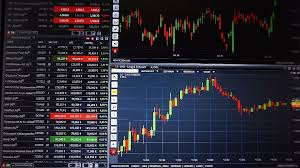- Professional Child Care Services
- (561) 562-5482
- (561) 389-7309
- info@joyfuljuneagency.com
Mastering Online Forex Trading Strategies and Insights
22Bet v České republice spolehlivý herní partner.335
October 31, 2025Kasino Mostbet Recenze.1645
October 31, 2025
In the dynamic world of finance, trading online forex Islamic Trading Platform has emerged as a significant player, facilitating seamless transactions for traders globally. Online forex trading, in particular, continues to capture the interest and imagination of both novice and seasoned traders alike. As you embark on this journey, understanding the fundamental mechanics and strategies of the forex market is crucial for achieving success.
What is Forex Trading?
Forex trading, or foreign exchange trading, is the process of buying and selling currencies on the foreign exchange market with the aim of making a profit. The forex market is one of the largest and most liquid financial markets in the world, with an average daily trading volume exceeding $6 trillion. This decentralized global market operates 24 hours a day, five days a week, providing traders with ample opportunities to engage in currency trades.
The Basics of Currency Pairs
In forex trading, currencies are traded in pairs. A currency pair consists of a base currency and a quote currency. The base currency is the first currency in the pair, while the quote currency is the second. For example, in the EUR/USD pair, the Euro is the base currency, and the US Dollar is the quote currency. The price of a currency pair indicates how much of the quote currency is required to purchase one unit of the base currency.
Types of Forex Orders
Understanding different types of forex orders is essential for effective trading. Here are the most common types of orders that traders utilize:
- Market Order: This order is executed immediately at the current market price.
- Limit Order: This order sets a specific price at which the trader wants to buy or sell a currency pair.
- Stop-Loss Order: This order automatically closes a position at a specified price to limit potential losses.
- Take Profit Order: This type of order closes a position once it reaches a specified profit target.

Understanding Leverage and Margin
Leverage is a powerful tool in forex trading that allows traders to control larger positions with a smaller amount of capital. It expresses the ratio between the amount of margin needed to open a position and the total value of the position. For instance, a leverage of 100:1 means that for every $1 a trader puts down, they can trade up to $100. While leverage can amplify profits, it comes with increased risk. Consequently, managing margin and understanding the implications of leverage is vital for successful trading.
Technical Analysis in Forex Trading
Technical analysis involves analyzing historical price data to forecast future price movements. Traders utilize various tools and indicators to identify trends and potential entry and exit points. Some popular technical analysis tools include moving averages, Relative Strength Index (RSI), and Bollinger Bands. By understanding price patterns and market signals, traders can make more informed decisions based on past performance.
Fundamental Analysis in Forex Trading
Fundamental analysis focuses on economic indicators, news events, and geopolitical developments that impact currency values. Important economic indicators include Gross Domestic Product (GDP), employment reports, interest rates, and inflation. By keeping abreast of these indicators and understanding their implications, traders can anticipate currency movements and adjust their strategies accordingly. Combining both technical and fundamental analysis can provide a comprehensive trading approach.
Developing a Trading Strategy
A trading strategy is a predetermined plan that guides a trader’s actions in the forex market. Developing a solid trading strategy involves identifying personal trading goals, risk tolerance, and timeframes. Successful traders often backtest their strategies on historical data before applying them in live markets. Popular trading strategies include day trading, swing trading, scalping, and position trading, each catering to different trading styles and market conditions.
Managing Risk in Forex Trading

Effective risk management is crucial in forex trading as it helps protect capital and minimize losses. Traders should define their risk level for each trade, typically expressed as a percentage of their trading account. Utilizing stop-loss orders and position sizing can also mitigate risk. Diversifying currency pairs and avoiding over-leveraging can further enhance risk management practices, allowing traders to survive and thrive in volatile markets.
The Role of Emotion in Trading
Emotional discipline is vital for successful forex trading. Fear and greed can drive impulsive decisions, leading to poor trading outcomes. Traders should develop a clear trading plan and adhere to it, regardless of market movements. Maintaining a trading journal can help track emotions, decisions, and outcomes, allowing traders to learn from past experiences and improve their performance.
Choosing a Forex Broker
Selecting the right forex broker is an essential step for any trader. Factors to consider include regulation, trading platforms, spreads, and customer support. A reputable broker should offer a user-friendly trading platform, robust security measures, and a variety of trading instruments. Additionally, understanding the broker’s fee structure is crucial, as transaction costs can significantly impact profitability.
The Importance of Continuous Learning
The forex market is constantly evolving, and traders must stay informed about new developments and trends. Participating in educational webinars, reading forex-related literature, and engaging with trading communities can enhance knowledge and skills. Embracing a growth mindset and learning from both successes and failures can contribute to long-term success in forex trading.
Conclusion
Online forex trading offers vast opportunities for profit, but it requires knowledge, skill, and discipline. By understanding the fundamentals, implementing effective trading strategies, and practicing sound risk management, traders can navigate the forex market successfully. As you embark on this trading journey, remember that continuous learning and emotional discipline are key to achieving your financial goals. Whether you choose to explore a traditional trading platform or delve into ethical trading options like the Islamic Trading Platform, the right approach will set the foundation for your success in the captivating world of forex trading.
